Clarification of Man’s Voluntary Act Based on an Explanation of Supplication (An Analysis of the Views of Ibn Sina, Mulla Sadra, and ‘Allamah Tabataba’i on Supplication)
Subject Areas :Roohallah Daraei 1 * , Tuba Kermani 2
1 -
2 - University of Tehran
Keywords: philosophy of act Mulla Sadra Supplication ‘Allamah Tabataba’i Worship invocation causal system Ibn Sina ,
Abstract :
Today the whatness of Man’s voluntary act, its explanation, and the range of their free will in the world of being is studied under the topic of “philosophy of act”. Muslim philosophers have presented some noteworthy innovations and solutions in this realm as well. In this tradition, supplication as a voluntary act is explored from two general aspects in both kalam and philosophy: its relationship with the Divine Will and its relationship with the necessity of the causal system. It was Ibn Sina who, for the first time, portrayed a framework for the problems related to this theme. However, some of his succeeding philosophers, such as Mir Damad, Mulla Sadra, Sabziwari, and ‘Allamah Tabataba’i, also made great contributions to the explanation and expansion of the realm of supplication through presenting a number of arguments and discussions. In this paper, the authors have examined the problem of supplication from the viewpoints of Ibn Sina, Mulla Sadra, and ‘Allamah Tabataba’i. A comparison of their views reveals that Ibn Sina has explained the problem of supplication within the causal system. He believes that each and every event is natural or voluntary at the level of affirmation, and natural, voluntary, or accidental at the level of demonstration. Accordingly, the difference between the “reason” and “cause” returns to the difference between the levels of affirmation and demonstration, and one cannot consider the reason and justification independent from the cause or clarification. While accepting the framework of Ibn Sina’s theory and considering supplication to be effective in the causal system, Mulla Sadra disagrees with him in certain respects. His explanation indicates that he considers a greater effect and range for the human voluntary act. Through believing in the gradation of existence, he advances two objections to Ibn Sina’s theory. When explaining the problem of supplication, Mulla Sadra refers to the gradation and union of the intellect and the intelligible; however, it is ‘Allamah Tabataba’i who provides a configuration for the expansion of the theory of the union of the intellect and intelligible when clarifying the concept of supplication, that is, explaining the relationship between the free will, the object of will, the will and, in the same vein, the relationship between the act, the agent, and the product. Through expanding Mulla Sadra’s view, ‘Allamah provides a more accurate explanation for supplication. Nevertheless, his view has been the target of criticism by some authorities.
قرآن مجيد.
ابن بابويه، محمد بن علي، من لايحضره الفقيه، قم، مؤسسه نشر اسلامي، 1413ق.
ابنسينا، الاشارات و التنبيهات، بهمراه شرح خواجه نصير و قطبالدين رازي، قم، مطبوعات ديني، 1384.
ابنسينا، التعليقات، تحقيق عبدالرحمن بدوي، بيروت، مكتبة الاعلام الاسلامي، 1404ق.
ابنسينا، المباحثات، قم، بيدار، 1371.
ابنسينا، النجاة، تهران، دانشگاه تهران، 1379.
جوادي آملي، عبدالله، تفسير انسان به انسان، قم، اسراء، 1389.
حلي، حسن بن يوسف، كشف المراد في شرح تجريد الاعتقاد، تحقيق و تصحيح حسن حسنزاده آملي، قم، مؤسسه نشر اسلامي، 1413ق.
دشتكي، غياثالدين، اشراق هياكل النور، تهران، ميراث مكتوب، 1382.
رازي، قطبالدين، المحاكمات، بهمراه متن اشارات و شرح خواجه نصير، قم، مطبوعات ديني، 1384.
سبزواري، ملاهادي، تعليقه بر أسفار الاربعة، در: الحكمة المتعالية في الاسفار العقلية الاربعة، بيروت، دار احياء التراث العربي، 1981م.
سبزواري، ملاهادي، شرح المنظومة، تصحيح و تعليق حسن حسنزاده آملي، تهران، نشر ناب، 1369.
سهروردي، مجموعه مصنفات شيخ اشراق، تصحيح و مقدمه هانري كربن، سيد حسين نصر و نجفقلي حبيبي، تهران، مؤسسة مطالعات و تحقيقات فرهنگي، 1375.
طباطبايي، سيد محمدحسين، اصول فلسفه و روش رئاليسم، قم، صدرا، 1368.
طباطبايي، سيد محمدحسين، الميزان في تفسير القرآن، قم، مؤسسه نشر اسلامي، 1417ق.
طباطبايي، سيد محمدحسين، تعليقه بر أسفار الاربعة، در: الحكمة المتعالية في الاسفار العقلية الاربعة، بيروت، دار احياء التراث العربي، 1981م.
فخررازي، محمد بن عمر، المباحث المشرقية في علم الالهيات و الطبيعيات، قم، بيدار، 1411ق.
فخررازي، محمد بن عمر، شرح علي الاشارات (شرحي الاشارات)، قم، كتابخانة آيتالله مرعشي، 1404ق.
كليني، محمد بن يعقوب، الكافي، تهران، دار الكتب الاسلامية، 1407ق.
مجلسي، محمدباقر، بحار الانوار، بيروت، دار احياء التراث العربي، 1403ق.
مصباح يزدي، محمدتقي، آموزش فلسفه، تهران، سازمان تبليغات اسلامي، 1366.
ملاصدرا، الحاشية علي الهيات الشفاء، قم، بيدار، بيتا.
ملاصدرا، الحكمة المتعالية في الاسفار الاربعة، ج2، تصحيح و تحقيق مقصود محمدي، تهران، بنياد حكمت اسلامي صدرا، 1380.
ملاصدرا، الحكمة المتعالية في الاسفار الاربعة، ج6، تصحيح و تحقيق احمد احمدي، تهران، بنياد حكمت اسلامي صدرا، 1381.
ملاصدرا، الحكمة المتعالية في الاسفار الاربعة، ج8، تصحيح و تحقيق علي اكبر رشاد، تهران، بنياد حكمت اسلامي صدرا، 1383.
ملاصدرا، الشواهد الربوبية في المناهج السلوكية، تصحيح و تحقيق سيدمصطفي محقق داماد، تهران، بنياد حكمت اسلامي صدرا، 1382.
ملاصدرا، المبدأ و المعاد، تصحيح و تحقيق محمد ذبيحي و جعفر شاهنظري، تهران، بنياد حكمت اسلامي صدرا، 1381.
ملاصدرا، ايقاظ النائمين، تصحيح و تحقيق محمد خوانساري، تهران، بنياد حكمت اسلامي صدرا، 1386.
ملاصدرا، شرح الاصول الكافي، ج3، تصحيح و تحقيق محمود فاضل يزدي مطلق، تهران، بنياد حكمت اسلامي صدرا، 1385.
ميرداماد، محمدباقر، القبسات، به اهتمام دكتر مهدي محقق و ديگران، تهران، دانشگاه تهران، 1367.
هروي، نظامالدين احمد، انواريه (شرح حكمة الاشراق سهروردي)، تهران، امير كبير، 1363. Charles, David, Aristotle's Philosophy of Action, Duckworth, 1984.
Davidson, Donald, “Actions, Reasons and Causes”, in Essays on Actions and Events, Oxford University Press, 2001.
Hyman, John; Steward, Helen (eds.) Agency and Action, Cambridge University Press, 2004.
Sneddon, Andrew, Action and Responsibility, Springer, 2006.

